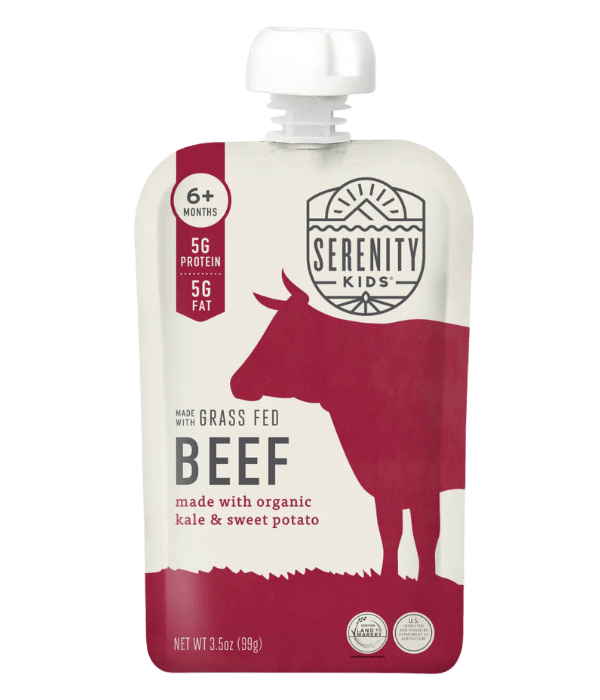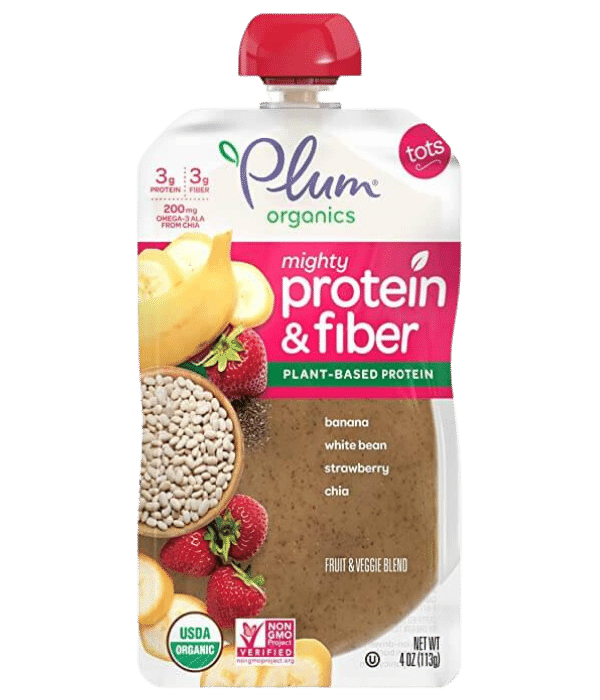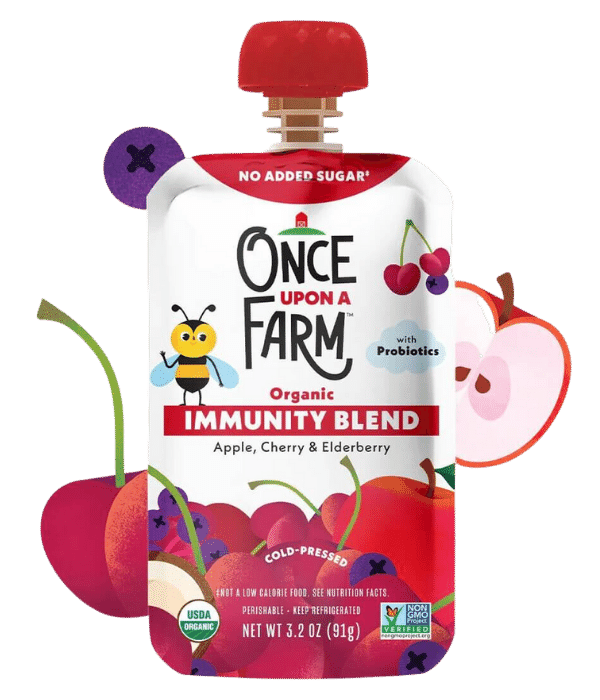Try our favorite, clean protein powder: See our top pick →
Try our favorite, clean protein powder: See our top pick →
This post contains links through which we may earn a small commission should you make a purchase from a brand. This in no way affects our ability to objectively critique the products and brands we review.
Evidence Based Research To fulfill our commitment to bringing our audience accurate and insightful content, our expert writers and medical reviewers rely on carefully curated research.
Read Our Editorial Policy
Parents, it’s safe to come out now.
Thanks to the best baby food brands on the market today, you can release your death grip on that blender and get yourself some organic baby food jars, puree pouches, and more with none of the hassle or the guilt.
In fact, standards of baby food quality and safety have now risen to such a state that we can afford to not even consider anything less than top-quality organic ingredients made and tested under the most stringent requirements—and that’s exactly what we did (er, didn’t do).
Without further ado, here’s our list of the 6 best baby food brands in 2023—Serenity Kids leading the way with their fat- and protein-rich puree pouches—chosen for their excellent ingredient quality, lack of preservatives, value, and more.

Using the macronutrient profile of breast milk as a guide, Serenity Kids emphasizes naturally derived fats and proteins in their organic baby food pouches.
All Serenity Kids products are tested for heavy metals, and the founders advocate for lowering these levels across the industry.

Plum Organics offers organic, non-GMO, preservative-free baby food pouches divided into three phases based on your baby’s age and experience.
Though we’d like to see a bit more protein, Plum Organics is our top pick for parents looking for an affordable baby food that doesn’t cut corners on quality or safety.
Best Overall | Runner-Up | Best Value | |
|---|---|---|---|
| Product | Serenity Kids | Once Upon a Farm | Plum Organics |
| Key Facts | Organic baby food pouches featuring meat, vegetables, and herbs more than fruit; tested for heavy metals; free of soy, grains, nuts, corn, gluten, added sugar, and preservatives. | Fruit and vegetable blends incorporating sources of omega-3 and choline from real foods (e.g., flax seed) among others; organic ingredients; Clean Label Project certified; must be kept refrigerated | Baby food pouches assorted into 3 different stages corresponding with age and preference; organic and non-GMO ingredients; no added sugars |
| Median Price* | $1.14/oz Shop Now | $1.18/oz Shop Now | $0.37/oz Shop Now |
Best for: Parents looking to instill a love of savory, nutritionally dense protein and vegetable choices before the flavor window closes.
Featuring avant-garde combinations like Wild Caught Salmon with Organic Butternut Squash and Beet, the mom-and-pop team behind Serenity Kids Baby Food pouches (and more) is not shy about their anti-fruit-puree stance.
As we learned from our review of the brand, Joe and Serenity Carr’s mission with Serenity Kids is to introduce fat, protein, and savory flavors to babies and toddlers in a macronutrient-balanced way that mirrors breastmilk.
Where most of us are accustomed to seeing berries, apples, and an occasional carrot thrown in when cruising the baby food aisle, the Serenity Kids collection tones the fruit down, opting instead to use the following:
As for what’s not there, Serenity Kids products are free of soy, grains, nuts, corn, gluten, added sugar, preservatives, and rice.
Serenity and Joe are also campaigning to raise awareness around the issue of heavy metals in baby foods, which they test for.
Virtually every ingredient in every pouch that can be organic is organic, and the meat sources are usually grass fed and free-range, where applicable.
As expected, these differentiators (the ingredients themselves + organic) come at a premium cost, but there simply is no getting around the nutritional quality of Serenity Kids—and yes, our pint-sized testers actually enjoyed the products.
Best for: Parents who want clean, organic ingredients in a nutritionally well-rounded selection of baby foods targeted for healthy development.
You may recognize the Once Upon a Farm packaging from Target (among some other major big and small retailers), and you may recognize the co-founder from, well, Hollywood movies.
Jennifer Garner’s isn’t the only farm they use to source their organic vegetables, but wherever each product/ingredient is sourced, Once Upon a Farm makes sure there is no added sugar and plenty of nutritious fruits, vegetables, and other ingredients, such as:
Though we’d like to see more protein, each USDA Organic, Non-GMO baby food pouch prioritizes nutrients crucial to developing brains and bodies, like omega-3 fatty acids (flax seeds, avocado), choline, and more, reflecting sound formulation know-how.
In addition to their fruit and veggie blends—Organic Green Kale & Apples is one of our favorites—Once Upon a Farm also offers dairy-free smoothies and overnight oats, making their overall selection one of the more robust among trusted brands.
Finally, Once Upon a Farm was the first baby food brand to receive the Clean Label Project Purity Award, which entails being tested for more than 400 environmental and industrial toxins.
If you’re looking for a super clean baby food pouch that goes well beyond the compulsory two-fruit blend when it comes to nutrient density, we recommend Once Upon a Farm.
Best for: Parents looking to introduce solid food at a younger age and/or those who need a highly affordable, organic baby food with decent meat options.
Curated into age-specific categories starting as young as 4 months old, Plum Organics baby food pouches are putting to death the saying, “Food before one is just for fun,” and rightly so.
You can cut that marker in half at least, says the American Academy of Pediatrics, and for parents who are savvily making the decision to introduce solid food at the 4-6 month mark, Plum Organics is a (don’t say it, don’t say it) solid choice. And coincidentally, it’s the most affordable choice on this list.
Here’s how Plum Organics organizes their baby food pouch selection:
Stage 1 is for babies as young as four months, and includes what we call their “Just” line: Just Mango, Just Sweet Potato, Just Peaches, and more.
Stage 2 is for babies as young as 6+ months, and comprises slightly more complex blends like Sweet Potato, Apple & Corn; Pear and Mango; Apple, Plum, Berry & Barley; and more.
Stage 3 marks the unveiling of your child’s inner gourmand, including such palate-pleasers as:
The first two stages don’t quite hit the nutritional density of Once Upon a Farm (albeit we realize stage 1 is more of a gentle introduction to solids), but we especially appreciate the savory meat and vegetable options in stage 3.
Whether or not you think you’ll stick with Plum Organics through all three phases, they provide clean, no-sugar-added, and organic baby food options targeted for each age group.
Best for: Parents looking for a broad selection of fruit and vegetable purees from a reliable, organic brand.
Happy Family Organics has jars, pouches, snacks, bars, and more. Like Plum Organics, the snacks and meals are appropriated to different stages of taste, development, and so on.
The baby food pouch selection—as differentiated from the toddler pouches—features more than three dozen products made with organic ingredients. Here are a few examples:
The baby food jars are more simplistic, usually featuring a single ingredient or two, such as bananas, apples, sweet potatoes, spinach, etc.
Once your little food critics become ambulatory—and hopefully less critical by this point—the toddler mealtime bowls work in some turkey, beef, and other savory sources of protein while keeping the vegetables a thing (Beef and Quinoa Fiesta Bowl is our pick here).
On a broader note, Happy Family Organics is B Corp Certified, and their philanthropy is definitely a cut above the rest of the brands on this list, as is their advocacy on behalf of parents and hungry children.
We recommend Happy Family Organics to anyone looking for an environmentally conscious and organic brand of baby (and toddler) food.
Best for: Parents looking for a highly sustainable baby food product that sticks to organic ingredients.
Earth’s Best Organics has diapers, wipes, and a wide variety of foods (organic formula, smoothies, snacks, electrolyte drinks, frozen entrees, etc.) for infants and toddlers in addition to their specialty (kosher and gluten-free) diet selection.
On the formula front, Earth’s Best iron-fortified formula comes in several variations that address common sensitivities (lactose-reduced for fussiness, etc.).
When it’s time for solids, Earth’s Best has infant grain and rice cereals, organic purees, and jars of baby food:
Like some of the other brands we’ve reviewed, the Earth’s Best Organics baby food (jars only) selection is divvied up into stages—4+ months (stage 1), 6+ months (stage 2), and 9+ months (stage 3)—with each stage incorporating more flavors and textures.
What really sets Earth’s Best Organics apart is how sustainable their farms are, which they’re very transparent about.
As the Our Growers page on the Earth’s Best Organics site describes, their farms and manufacturers (they have a USDA-certified organic milling operation) use sustainable practices to produce everything organically, including bananas from Ecuador, sweet potatoes and squash from North Carolina, and more.
Best for: Parents who prefer gently processed, natural baby foods available in a wide variety of flavors and textures.
Apt to cause another Mandela effect for the Target frequenter is Beech-Nut Naturals (yes, that’s probably where you’ve seen it), a brand that offers a broad variety of infant cereal, baby food jars, pouches, and snacks for little ones as young as 4 months of age.
In addition to accommodating soy, peanut, tree nut, dairy, wheat, and other allergies or sensitivities, the Beech-Nuts product offering incorporates various targeted formulations meant to support immunity.
Also, one version of their melties comes with probiotics to support digestive health (and again, immunity).
Not all of Beech-Nut Naturals’ baby food jars and pouches are organic—they’re separated into Naturals and USDA-Certified Organic lines—but they all appear to be completely free of added sugar and preservatives.
From single-ingredient purees like apple, banana, green beans, and pear to more complex combinations like apple, pumpkin and cinnamon for older babies, the selection appears to reasonably accommodate the tastes and preferences of kids throughout key developmental windows between 6 and 12 months.
Finally, one reason we prefer Beech-Nut Naturals over most brands is their gentle cooking and process, which uses indirect heat to preserve as much of the nutritional value and flavor of their non-GMO and (sometimes) organic ingredients as possible.
The ingredients are first cold-pureed, vacuum sealed to eliminate the need for preservatives, and then gently cooked. Here’s a more detailed breakdown of their process.
Though our top pick is Serenity Kids, we understand that several factors can affect how well-suited a particular brand of baby food is for your situation, including dietary restrictions, tastes, what else the child eats throughout the day, price, and more. That said, we believe Serenity Kids accommodates the broadest audience while maintaining the highest standards of quality, thanks to the much greater emphasis on grass-fed beef, free-range chicken, and other sources of protein and fat.
We can’t single out any particular brand as the safest on the market—we consider all of the above brands to be on the same level of safety—but in general, these are the signs you should be looking for:
Ingredient quality—Organic (look for the certification), non-GMO, fruits and vegetables, seeds (e.g., flax seed), meat, etc.
Testing standards—Does the brand test their products? What are they testing for? Heavy metals is a start, and more comprehensive tests for pesticides and other contaminants is an excellent indicator of a thoroughly tested product.
Packaging—This one is often overlooked. Is the lid of the container a choking hazard? Is a glass container safe for a child in a throwing phase?
As for the best first-stage baby food products and brands, is another case where we are reluctant to declare a clear winner, with such a wealth of options available, but Happy Family Organics is an excellent example of multi-phase baby food selection that matches the appropriate flavors and textures to each age group.
In general, 1st stage baby food should be very simplistic in both flavor and texture. We want to see one or two ingredient blends with no strong spices, and it’s important that the texture is very soft. In most cases, grain cereals fit this description nicely, and are often fortified with iron and/or other nutrients.
This is a guideline promoted by the CDC that refers to the amount of time parents should wait before giving their baby a new food item to try. The range that the CDC actually recommends is 3 to 5 days, and they also say you should “introduce potentially allergenic foods when other foods are introduced.”
Starting solids (especially for baby #1) can be exciting, but it’s a wise practice to introduce one ingredient/flavor at a time.
Along those lines, it’s also important not to overwhelm your baby with multiple and/or difficult textures, which is an element we adults often forget about.
The flavor window is a real thing; introducing meat, vegetables, herbs, and other savory flavors before the age of one can help prevent picky eating habits.
There’s no need to compromise on a baby food brand. Our list is meant to model all the key criteria parents should have: ingredient quality and safety, testing and manufacturing standards, and value, to name a few.
Subscribe now and never miss anything about the topics important to you and your health.